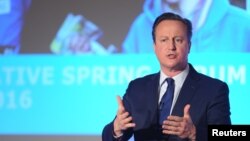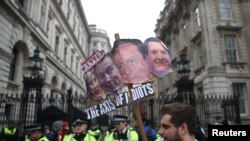British Prime Minister David Cameron will face lawmakers' questions about his tax affairs Monday—and try to restore his government's shaken reputation for competence—after days of damaging headlines about his links to an offshore wealth fund in fallout from the so-called Panama Papers leak.
As Parliament returns from an Easter break, opposition leaders plan to challenge Cameron in the House of Commons over past investment in an offshore account set up by his late father.
Cameron's father, Ian Cameron, has been identified as a client of a Panamanian law firm that specializes in helping the wealthy reduce their tax burdens. More than 11 million documents from the firm Mossack Fonseca have been leaked to international media, in one of the biggest data breaches in history.
Ian Cameron's fund, Blairmore Holdings, was not illegal, but revelations about the Cameron family finances have overshadowed the government's claim that it is committed to closing tax loopholes.
David Cameron, a former PR man with a reputation for sharp political intuition, appears to have been caught off-guard by the issue. His office initially insisted that the prime minister's financial arrangements were private, before acknowledging that Cameron and his wife had sold some 30,000 pounds ($44,000) in shares in the offshore fund shortly before he became prime minister in 2010.
Finally, on Sunday Cameron published a summary of his tax returns since 2009, becoming the first British leader to do so. The records appear to show that Cameron paid his full share of tax—75,898 pounds on taxable income of 200,307 pounds in the most recent tax year.
But the document also generated a new round of headlines over a 200,000 pound gift from his mother on which Cameron—completely legally — paid no tax.
Several other politicians, including Scottish First Minister Nicola Sturgeon, followed Cameron's lead and published their tax returns, and more are likely to follow.
There is no suggestion that Cameron or his father, who died in 2010, did anything illegal. But the headlines have served to remind the public of Cameron's wealth and privilege, allowing opposition politicians to paint him as remote from the financial worries of ordinary people.
The furor could also have repercussions for Britain's decision on European Union membership, due in a June 23 referendum. Cameron is the leading proponent of a vote to stay in, and anything that tarnishes his brand could undermine the “remain'' campaign. Newspapers with an anti-EU editorial line have kept the story of his taxes on their front pages for days.
Cameron has championed greater financial transparency in Britain and abroad, and is due to host an international anti-corruption summit in London next month.
In a bid to regain momentum on the tax issue, Cameron announced Monday that the government would introduce a bill holding employers criminally liable if they permit employees to promote tax-dodging schemes.
“This government has done more than any other to take action against corruption in all its forms, but we will go further,'' he said.






